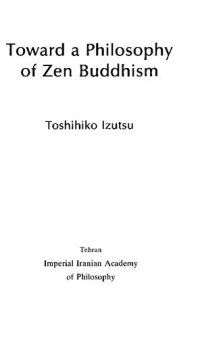
Ebook: Toward a Philosophy of Zen Buddhism
Author: Toshihiko Izutsu
- Genre: Other Social Sciences // Philosophy
- Tags: zen buddhism, zen philosophy
- Year: 1977
- Publisher: Imperial Iranian Academy of Philosophy
- City: Tehran
- Language: English
- pdf
This book is entitled ‘Toward a Philosophy of Zen Buddhism’ on the conviction that Zen is possessed of innate philosophical possibilities. This conviction of the author is based on the view that at the original point of all Philosophiren in any form whatsoever, there is, and there must be, a peculiar reality-experience. The empiricist philosophy, for instance, is based on, and originates from, an ‘empirical’ experience of reality. The empiricist type of thinking begins by observing reality just at the level at which man encounters the external world through what is regarded as the ‘normal’ exercise of his cognitive faculties, sensation and perception being considered the most fundamental forms of cognition. The empiricist philosophy takes form when one starts to reflect upon one’s own perceptual experience in a rational and analytical way.
Zen also has its own peculiar experience of reality, which is remarkably different from the ‘empirical’ one. Not that Zen ‘transcends’ at one stroke — as is often said — the empirical dimension of reality. Quite the contrary; the world of Zen at its ultimate stage is also a world of sensation and perception which is no less ‘empirical than the world as seen by the empiricist. ‘The ordinary way — that precisely is the Way’, or ‘the willow is green and the flower is red’. The point is rather that sensation and perception as activated in Zen experience assume quite a different significance as they function quite differently from the same faculties of sensation and perception as they are activated on the level of the so-called ‘normal’ cognitive experience. Hence the peculiarity of the Zen experience of reality. And naturally the peculiar noetic experience produces, or is capable of producing, a unique type of ontology. What, then, is the nature of the noetic experience peculiar to Zen? This is one of the main problems dealed with in this book.
The present work is not a systematic and objective presentation of the philosophical ideas of Zen. It is rather a modest attempt at letting Zen experience philosophize itself. This book consists of seven Essays, all of which were originally independent papers or lectures by the author prepared on different occasions.
About the author: https://en.wikipedia.org/wiki/Toshihiko%20Izutsu
Zen also has its own peculiar experience of reality, which is remarkably different from the ‘empirical’ one. Not that Zen ‘transcends’ at one stroke — as is often said — the empirical dimension of reality. Quite the contrary; the world of Zen at its ultimate stage is also a world of sensation and perception which is no less ‘empirical than the world as seen by the empiricist. ‘The ordinary way — that precisely is the Way’, or ‘the willow is green and the flower is red’. The point is rather that sensation and perception as activated in Zen experience assume quite a different significance as they function quite differently from the same faculties of sensation and perception as they are activated on the level of the so-called ‘normal’ cognitive experience. Hence the peculiarity of the Zen experience of reality. And naturally the peculiar noetic experience produces, or is capable of producing, a unique type of ontology. What, then, is the nature of the noetic experience peculiar to Zen? This is one of the main problems dealed with in this book.
The present work is not a systematic and objective presentation of the philosophical ideas of Zen. It is rather a modest attempt at letting Zen experience philosophize itself. This book consists of seven Essays, all of which were originally independent papers or lectures by the author prepared on different occasions.
About the author: https://en.wikipedia.org/wiki/Toshihiko%20Izutsu
Download the book Toward a Philosophy of Zen Buddhism for free or read online
Continue reading on any device:

Last viewed books
Related books
{related-news}
Comments (0)